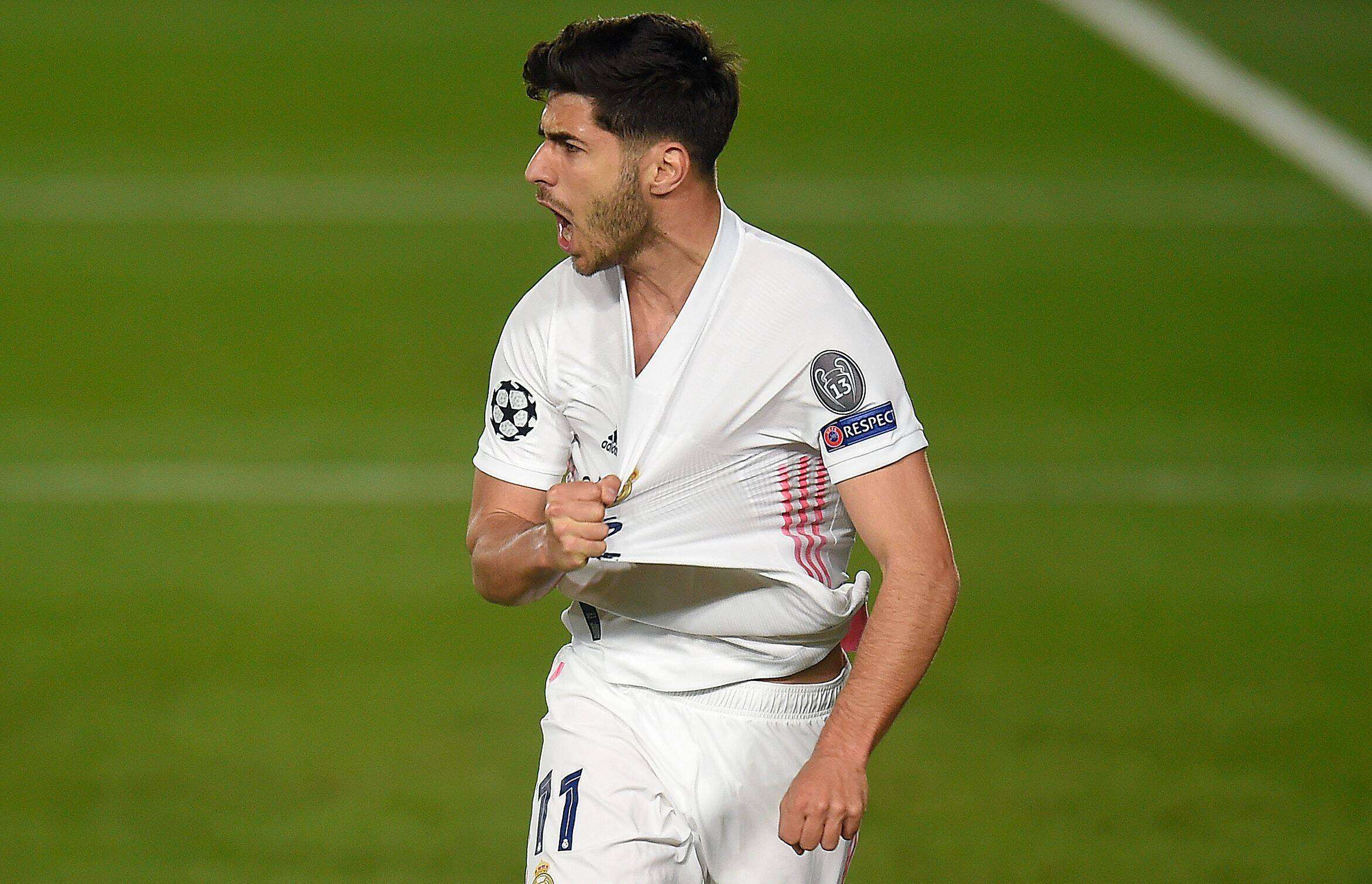It has not been a great week in Spanish football after Valencia defender Mouctar Diakhaby accused Cádiz centre-back Juan Cala of racism. The Frenchman left the pitch after the half hour mark and was visibly upset. Whilst nothing has been proven, the allegations, at the time of writing, are still active.
Despite this incident, there are undeniably some reasons to be optimistic as football in Spain uses its platform for good in the continuous fight for equality.
When Marco Asensio, one of the in-form players in this rejuvenated Real Madrid side, dinked the ball over Liverpool’s Alisson and slotted it in the back of the empty net, he would do more than give the defending LaLiga champions a 2-0 goal advantage.
Indeed, after the match, as modern footballers tend to do these days, the Mallorca-born winger uploaded a tweet about this goal which would go viral.
His tweet saw him upload an image of him and Real Madrid and Spanish international goalkeeper Misa Rodríguez as they both kissed the Real Madrid badges under the caption “the same passion.” The message from Asensio was clear.
Misma pasión ⚪ 💪
— Marco Asensio (@marcoasensio10) April 7, 2021
Que nada ni nadie te impida decir lo que piensas.@marisabelrr1 @realmadridfem @realmadrid pic.twitter.com/wLybiMhGkS
Whilst this was a positive tweet, unfortunately the story does not even begin here.
The female shot-stopper had originally published this tweet herself, but quickly deleted it following a wave of sexist abuse online.
Since Asensio’s tweet, Real Sociedad, Barcelona and Tottenham Hotspur (as well as a host of other clubs) have all uploaded similar social media posts in support of their female stars.
Misma pasión 💙⚪️#AurreraReala pic.twitter.com/hpDbAiYqeD
— Real Sociedad Fútbol (@RealSociedad) April 7, 2021
Misma pasión 💙❤️ pic.twitter.com/CYRiSMxBIj
— FC Barcelona (@FCBarcelona_es) April 7, 2021
Misma pasión 🤍 @SpursWomen pic.twitter.com/KBPZnrFMaA
— Tottenham Hotspur (@Spurs_ES) April 7, 2021
Asensio has also been followed by some of his fellow Real Madrid team-mates such as Raphael Varane, Fede Valverde and Vinicius Junior.
We must do more to fight against racism, sexism, homophobia and all forms of discrimination. They have no place in football or in society.
— Raphaël Varane (@raphaelvarane) April 7, 2021
We are 𝑨𝑳𝑳 equal! pic.twitter.com/rmWNxF6SsW
🖤 Misma pasión 🤍@marisabelrr1 @realmadridfem @realmadrid pic.twitter.com/ld7oiRUjij
— Fede Valverde (@fedeevalverde) April 7, 2021
🤍 Misma pasión 🤍 @marisabelrr1 🤍 @realmadrid pic.twitter.com/9PrAnBJNAA
— Vini Jr. (@vinijr) April 7, 2021
Spanish sports daily Marca also put “la misma pasión” on their front page today (Thursday).
#LaPortada 🗞 𝐌𝐢𝐬𝐦𝐚 𝐩𝐚𝐬𝐢𝐨́𝐧 https://t.co/R595pOYuOu
— MARCA (@marca) April 8, 2021
This social media support for Misa Rodríguez has not just come from the world of football either as former NBA star Pau Gasol was quick to compose a tweet.
Misma pasión!! 🏀💪🏽#LaFamilia #SomosEquipo #MismaPasión pic.twitter.com/05J5vLv7vA
— Pau Gasol (@paugasol) April 8, 2021
In spite of the overwhelming support of this spontaneous and ongoing campaign, many of these positive tweets have also received negative, misogynistic replies.
And the fact that Rodríguez felt compelled to delete her original post shows exactly why these types of campaigns are much needed in the first place.
Gracias desde el corazón. #MismaPasion pic.twitter.com/lYEaFJd3wS
— M1SA (@marisabelrr1) April 8, 2021
Last January, a male cricketer from New Zealand called Finn Allen hit 73 runs off 35 balls. And when a group of kids were asked about his performance, one boy replied “not better than Sophie Devine but pretty good.”
This little dude knows his stuff! What a testament to the Women's game 👏👏
— Michelle Prendiville (@michelleprendi) February 7, 2021
Finn Allen's *73 off 35 balls "not better than Sophie Devine, but still pretty good!" @1NewsSportNZ @cricketwgtninc pic.twitter.com/sgX8bLa3ru
Devine is one of the world’s best batters in the female game and this clip also went viral on social media. This incident is important as we still live in an age in which every mistake made by a female footballer seems to be pounced upon.
Just like Asensio’s tweet, it is vital that comparisons are made in favour of a female sportstar rather than to put her down.
Machismo is still an issue in Spain (in sport and wider society), and hopefully this type of campaign can do much in the long fight to eradicate gender inequality.
Female football in Spain
Naturally, these posts should also be seen within the context of women’s football in Spain. A month ago to the day, to celebrate International Women’s Day, this writer wrote an article celebrating some of the women who had broken barriers in men’s football in Spain. Whether they be journalists, assistant referees, physios or commentators, they have all faced machismo whilst trying to hold a career in the sport they love.
In spite of these challenges, it is also true to say that women’s football has experienced an increase in popularity in recent years.
In 2019, just over 60,000 packed the Wanda Metropolitano to watch Atlético Madrid and Barcelona’s female sides do battle.
Even the fact that Real Madrid have finally created a female side (which only happened officially in 2020) demonstrates the increasing power and popularity of the game.
In 2019, female footballers went on strike over low and part-time pay, so the recent announcement that the top-flight in Spain will become professional as of next season is another positive step forward.
But it is also true that the global pandemic has had a major impact on the game, especially considering the lack of crowds which has halted the momentum female football was gaining, just like it has in the UK.
Women’s football (and sport more generally) is undeniably on the up, in Spain, in the UK and in many other places around the globe.
And yet Marco Asensio and co still feel the need to use their social platforms to highlight ongoing issues with misogyny and sexism.
Whilst the messages in support of Misa Rodríguez (and female football more broadly) are positive, heart-warming and show the very best of social media, there has been enough misogynistic backlash to demonstrate the endemic machismo that still exists in contemporary Spain.
With the increasing influence female football is attracting, and the greater effort clubs are putting into these sides, financially and otherwise, many aspects of female sport are improving.
But as the Misa Rodríguez incident has shown, we are a long way off from gender equality in Spanish football.
A female footballer cannot even kiss the badge of their own team without getting abuse.
Even if it’s with the same passion.










